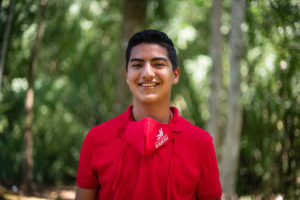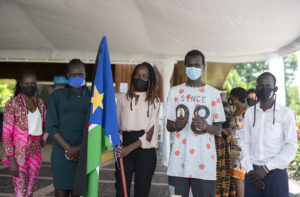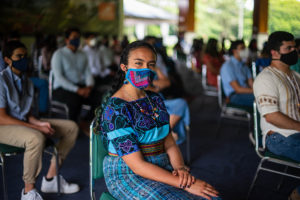When ‘virtual’ became a virtue
Francisco Hercules (’24, Honduras) was in the midst of applying to EARTH University, when he was forced to navigate a series of unexpected, escalating challenges. Not only was his family affected by COVID-19’s many social and economic recoils – his mother fell critically ill. Not only was Honduras hit by two hurricanes – his family’s house was destroyed.
So that Francisco could achieve his dream of studying at EARTH, the Admissions team collaborated with the Global Development Unit to find him the necessary financial support to become part of the University’s Class of 2024. And they succeeded, helping him obtain a full scholarship from Mastercard Foundation.
Our Admissions officers work tirelessly to make dreams come true. Each year, they launch an international search to locate passionate young people committed to sustainable development and soil-safe agricultural practices. Afterward, they arrange for newly admitted students to travel to Costa Rica’s humid tropics, learn experientially for four years under the guidance of a prestigious faculty, and then – equipped with interdisciplinary knowledge, skills, and networks – return to their home countries to lead improvements within farming communities.
In 2020, the Admissions Office was forced to convert its traditional globe-trotting process into an entirely virtual one – conducting exams, interviews, and socioeconomic studies all online.
“Our goal was to be able to interview all candidates – no matter where they were,” says John Awiel Chol (’19, South Sudan), an Admissions officer for the African continent. “For example, most of our African applicants live in rural areas, where they lack a stable internet connection. Sometimes, while we were running an interview or a test, the candidate’s internet would go down. So, we ended up doing a lot of waiting and repeating.”
Once admitted, many new students were enrolled in intensive Spanish-language acquisition courses, which also had to be conducted online. Recognizing the technical difficulties that occurred during the remote admissions process, the team sprang into action to minimize the digital divide. “We coordinated to send money, so students could buy good internet access and connect to class every day,” John adds.
With ingenuity and adaptability, the Admissions team evaluated more than 1,500 applicants, ultimately selecting 120 young people from 26 countries. Those 59 women and 61 men started the academic year on January 25.
According to Charlyn Masís (’18, Costa Rica), an Admissions officer for Latin America, this cohort stands out for many reasons, including its large Central American representation and, thanks to a new scholarship initiative with Mastercard Foundation, its inclusion of six refugee students.
Zulema Jiménez, an Admissions officer for the Caribbean, worked to digitize the teaching process to virtually include students from Haiti, who – due to pandemic restrictions – have not yet been able to enter Costa Rica. She also ensured each of them got a computer and connectivity.
Francisco arrived from Honduras a few days ago and is settling into campus life. He expressed gratitude to two EARTH professionals who were instrumental in his journey: María Fernanda Sáenz, an Admissions officer for Latin America, and Fabiola Ramírez, a Development officer, for their efforts to secure funding for him as well as their kindness toward his family during a distressing year.
To the Development Unit and the Admissions Office, mil gracias for making the best of any situation – and turning virtuality into a virtue!







